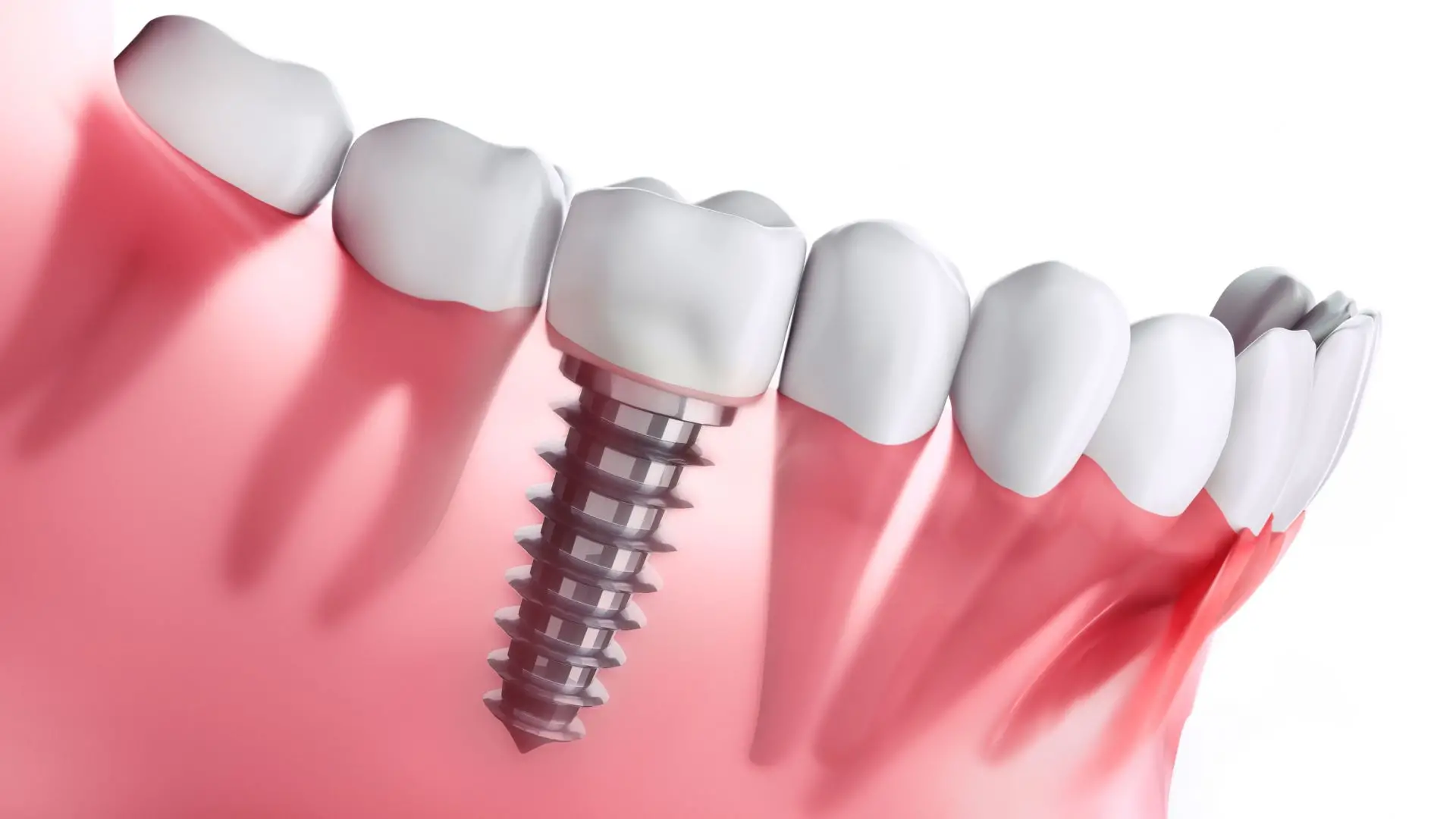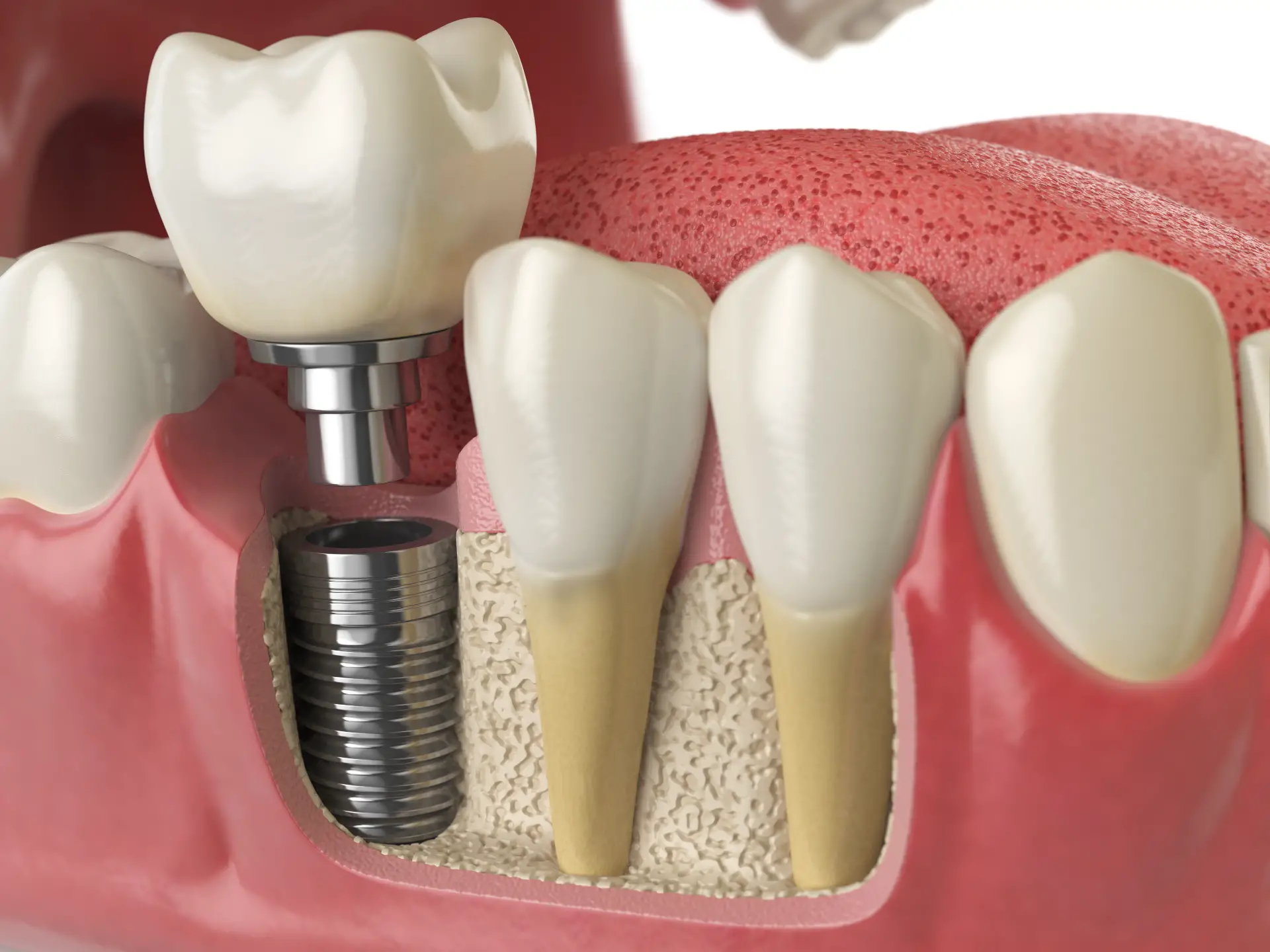A dental implant is a titanium post that’s surgically placed into the jawbone beneath the gum line to serve as a stable anchor for replacement teeth. This artificial root allows for the attachment of a crown, bridge, or denture, offering a long-lasting solution for those missing one or more teeth. Unlike dentures or bridges, dental implants do not come loose and can significantly improve oral health and functionality.
In this article, you’ll discover the ins and outs of dental implants, including the types available, the process involved in getting them, and how to properly care for them once they’re in place. We aim to provide you with a comprehensive understanding of dental implants, so you can make an informed decision about whether they are the right option for restoring your smile.
The decision to get dental implants can be life-changing, offering not just a cosmetic enhancement but a boost in confidence and the ability to eat, speak, and laugh without concern. We understand the impact that missing teeth can have on daily life, and through the information provided, we’ll show you how these can offer a durable, natural-looking solution.
Key Takeaways
- Dental implants are like superhero anchors for your teeth, giving you back your smile and the power to chomp on your favorite snacks without worry.
- They’re not just for looks; these titanium wonders help keep your jawbone strong and stop your face from looking older than your favorite pair of sneakers.
- Getting them is a bit of an adventure, involving a few steps, but it’s all worth it when you can smile, talk, and eat without giving it a second thought.
- Not everyone can jump on the dental implant train right away. You’ve got to have enough bone in your jaw, be in good health, and be ready to take care of them.
- Just like any adventure, there can be some bumps along the way, like the risk of infection or the implant not playing nice with your bone, but with a good dental sidekick, these can usually be tackled head-on.

What are dental implants?
Dental implants are artificial tooth roots that are surgically positioned into the jawbone beneath your gums. Far from mere stand-ins, these robust and dependable pillars provide a steadfast grip for prosthetic teeth.
Unlike traditional dentures or bridges, dental implants provide a permanent base for fixed, replacement teeth. Designed to blend seamlessly with your natural teeth, they offer both functionality and visual appeal.
The Components of Dental Implants
Dental implants consist of three main components:
- The implant post: This is typically made from titanium and acts as the root for your new tooth. It’s surgically placed into the jawbone where it fuses with the bone tissue over time through a process known as osseointegration. This fusion creates a sturdy foundation just like that of natural teeth.
- The abutment: Attached to the implant post once integration has occurred, this component serves as an anchor for your new tooth (or crown). The abutment securely holds everything together but remains beneath the gum line until the final restoration is complete.
- The crown: Custom-made to match your natural teeth in color and shape, crowns are attached to the abutment providing you with functional biting surfaces and restoring aesthetics. Made from various materials including porcelain or ceramic, these prosthetic parts are what people see when you smile.
Benefits of Choosing Dental Implants
When it comes to replacing missing teeth, dental implants stand out as a superior solution for many patients. Not only do they offer an aesthetically pleasing appearance, but their functionality and health benefits are unmatched. Let’s explore why choosing dental implants can be a transformative decision for your oral health and overall well-being.
1. Improved Oral Health and Prevention of Bone Loss
Dental implants play a crucial role in preserving oral health by preventing bone loss that occurs when teeth are missing. Unlike other tooth replacement options that merely rest on the gum surface or use adjacent teeth as support, dental implants integrate with the jawbone, stimulating it and preventing atrophy. This process not only maintains jawbone integrity but also ensures the longevity of the implant itself.
2. Natural Look and Feel
The design of dental implants closely mimics natural teeth, both in appearance and function. They are carefully crafted to match the color, shape, and size of your surrounding teeth, providing a seamless integration into your smile. The secure fit offers peace of mind; you won’t have to worry about slipping or discomfort often associated with dentures.
3. Increase Comfort & Restored Ability to Eat Comfortably
Dental implants eliminate eating difficulties by restoring full chewing power. Patients can enjoy their favorite foods without hesitation or fear of discomfort – something that is often compromised with traditional dentures or bridges.
4. Enhanced Appearance & Improved Confidence
A significant benefit reported by those who choose dental implants is enhanced self-esteem due to improved aesthetics. Missing teeth can lead to sagging facial features over time; however, because dental implants mimic natural tooth roots, they provide the necessary stimulation for maintaining facial structure, helping you look younger and longer.
5. Durable Solution Compared To Other Options
With proper care, dental implants can last a lifetime, unlike dentures or bridges which may need replacements every 5 to 10 years.

How Do Dental Implants Work?
Dental implants have revolutionized the way we approach missing teeth, offering a durable and aesthetically pleasing solution. But how exactly do these tiny yet powerful devices work to restore your smile?
The Procedure Steps
The journey to a restored smile with dental implants involves several key steps:
- Placement: The process begins with the surgical insertion of the implant into the jawbone. This titanium post serves as a new root for your tooth.
- Healing: After placement, a period known as osseointegration occurs where the bone fuses with the implant. This critical phase can take several months but ensures stability for your new tooth.
- Crown Attachment: Once healed, an abutment is placed on top of the implant to hold your custom-made crown – this is what gives you back your functional and aesthetic smile.
This straightforward procedure has provided countless individuals with renewed confidence in their smiles. For more detailed information on each step, visit our comprehensive guide on dental implant procedures.
Types of dental implants
Dental technology offers various types of implants tailored to meet individual needs:
- Endosteal Implants: The most common type involving screws or cylinders inserted directly into the jawbone.
- Zygomatic Implants: A less conventional option that anchors onto cheekbones when there isn’t enough jawbone for traditional methods.
- All-on-4® Treatment Concept: Designed specifically for those needing full upper or lower teeth replacement using only four strategically placed implants per arch.
Who Is a Good Candidate for Dental Implants?
Determining if you’re a suitable candidate for dental implants is crucial for the success of the procedure. Generally, a good candidate for dental implants is someone who:
- Has one or more missing teeth: Dental implants are designed to replace missing teeth, providing a stable and aesthetically pleasing solution.
- Has a fully grown jawbone: The jawbone must reach full growth, which typically occurs in late adolescence or early adulthood.
- Has sufficient bone density: Adequate jawbone density is necessary to support the implant. If bone loss has occurred, bone grafting might be required before proceeding with the implant.
- Has healthy oral tissues: Healthy gums are essential for the success of dental implants. Gum disease or other oral health issues need to be addressed prior to implant surgery.
- Doesn’t have health conditions that affect bone healing: Certain chronic conditions, such as diabetes or osteoporosis, can impede bone healing and may affect the success of the dental implant.
- Is a non-smoker or willing to quit: Smoking can hinder the healing process and negatively impact the long-term success of the dental implant.
- Is willing to commit to the process: Getting dental implants can be a months-long process, requiring patience and commitment to follow-up appointments and proper oral hygiene.
It’s also worth noting that every individual’s situation is unique, and the best way to determine if you’re a candidate for dental implants is to consult with a dental professional. They can assess your oral and overall health, review your medical history, and recommend the best course of action based on your specific needs.
During your consultation, be prepared to discuss your health history and any medications you’re taking, as these can influence your suitability for dental implants. Remember, the goal is not only to improve the appearance of your smile but also to enhance your oral health and functionality.
So, if you’re missing one or more teeth and meet the criteria mentioned above, you might be an excellent candidate for dental implants. However, the final determination should be made in consultation with a dental professional, who can ensure that your individual health profile aligns with the requirements for a successful implant procedure.
Comparing Dental Implants to Other Tooth Replacement Options
When it comes to replacing missing teeth, dental implants are often pitched against traditional contenders like dentures and bridges. But what sets them apart? Let’s break it down.
Dental Implants vs. Dentures
Dental implants boast a design that mimics the root of your natural tooth, anchoring securely into the jawbone. Offering unparalleled steadiness, this base outshines dentures that merely perch atop the gums, often leading to slippage or unease. Additionally, implants contribute to maintaining the vigor of your jawbone by encouraging bone development—a feature that dentures are unable to offer.
The convenience factor also leans heavily in favor of implants; they don’t require removal for cleaning or nightly soaks as dentures do. Plus, you’ll never need to worry about your teeth slipping out while eating or talking—a common concern with denture wearers.
Dental Implants vs. Bridges
Bridges fill gaps by anchoring onto adjacent teeth after modifying them for support—an approach that doesn’t sit well with everyone since it involves altering healthy teeth. On the flip side, dental implants stand alone without relying on neighboring teeth for support, preserving more of your natural smile.
Implants also offer longevity that bridges struggle to match; with proper care, they can last a lifetime whereas bridges typically need replacement every 5-15 years.
Potential Risks and Complications of Dental Implants
While dental implants are highly successful and offer a long-term solution for replacing missing teeth, as with any surgical procedure, there are potential risks and complications that candidates should be aware of. Understanding these risks is crucial for making an informed decision. Here’s what you need to know:
- Infection at the implant site: As with any surgery, there’s a risk of infection. This can occur around the implant and in the gums. Proper oral hygiene and following post-operative care instructions can minimize this risk.
- Injury or damage to surrounding structures: During the implant procedure, nearby teeth, blood vessels, or nerves could be damaged. This might result in pain, numbness, or tingling in your teeth, gums, lips, or chin. While these symptoms are often temporary, they can be permanent in rare cases.
- Nerve damage: This can result in pain, numbness, or a tingling sensation in your natural teeth, gums, lips, or chin.
- Implant failure: Although rare, dental implants can fail to integrate with the jawbone properly, leading to loosening or failure of the implant. Smoking, poor oral hygiene, and certain medical conditions can increase this risk.
- Sinus problems: For implants placed in the upper jaw, there’s a risk that the implant could protrude into the sinus cavities, leading to sinusitis or other issues.
- Bone loss around the dental implant (peri-implantitis): Similar to gum disease, peri-implantitis affects the bone around the dental implant. It’s often the result of poor dental hygiene and can lead to implant failure if not addressed.
- Overloading: If the implant is subjected to excessive force too soon, it can lead to failure in bonding with the jawbone.
To mitigate these risks, it’s important to choose a qualified and experienced dental implant specialist. A thorough assessment of your oral health, along with a detailed treatment plan, can help minimize complications. After the procedure, following your dentist’s instructions for care is crucial for the healing process and the long-term success of your dental implant.
Regular dental check-ups and proper oral hygiene are key to preventing complications. If you experience any unusual symptoms after your dental implant surgery, such as severe pain, swelling, or bleeding, contact your dental professional immediately.

The Choice for a Confident Smile: Are Dental Implants Right For You?
Dental implants are indeed an investment – an investment in your health, your smile, and your overall confidence. They offer a durable, natural-looking, and long-lasting solution that can enhance your life in many ways.
The decision to proceed with dental implants is a personal one, and it’s essential to be well-informed about the process, potential risks, and how to care for your implants to ensure their longevity. If you’re ready to reclaim your smile and bite into life with renewed confidence, the best way to determine your suitability for dental implants is to schedule a consultation with a qualified dental professional.
Ready to Rediscover the Power of Your Smile?
Dental implants can be a life-changing solution for missing teeth, restoring your ability to eat, speak, and smile with confidence. If you’re inspired by the possibilities dental implants can offer, let the experts at Image Dental help you take the next step.
We understand choosing dental implants is a big decision. That’s why we offer personalized consultations to discuss your unique needs, explore your options, and answer any questions you may have about this transformative procedure.
Book now online or call us at (209) 955-1500 and start your journey toward a restored radiant smile!



